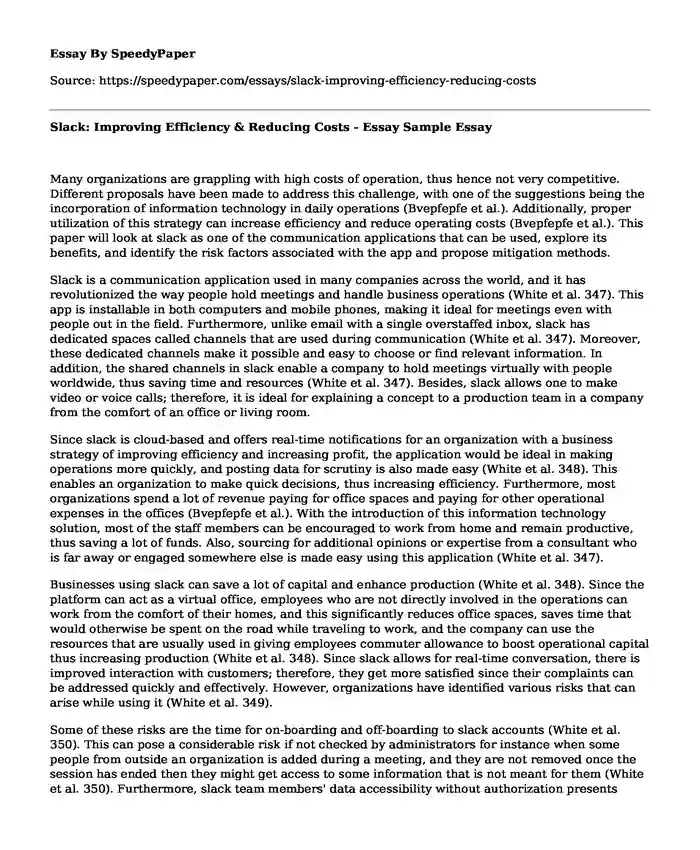Many organizations are grappling with high costs of operation, thus hence not very competitive. Different proposals have been made to address this challenge, with one of the suggestions being the incorporation of information technology in daily operations (Bvepfepfe et al.). Additionally, proper utilization of this strategy can increase efficiency and reduce operating costs (Bvepfepfe et al.). This paper will look at slack as one of the communication applications that can be used, explore its benefits, and identify the risk factors associated with the app and propose mitigation methods.
Slack is a communication application used in many companies across the world, and it has revolutionized the way people hold meetings and handle business operations (White et al. 347). This app is installable in both computers and mobile phones, making it ideal for meetings even with people out in the field. Furthermore, unlike email with a single overstaffed inbox, slack has dedicated spaces called channels that are used during communication (White et al. 347). Moreover, these dedicated channels make it possible and easy to choose or find relevant information. In addition, the shared channels in slack enable a company to hold meetings virtually with people worldwide, thus saving time and resources (White et al. 347). Besides, slack allows one to make video or voice calls; therefore, it is ideal for explaining a concept to a production team in a company from the comfort of an office or living room.
Since slack is cloud-based and offers real-time notifications for an organization with a business strategy of improving efficiency and increasing profit, the application would be ideal in making operations more quickly, and posting data for scrutiny is also made easy (White et al. 348). This enables an organization to make quick decisions, thus increasing efficiency. Furthermore, most organizations spend a lot of revenue paying for office spaces and paying for other operational expenses in the offices (Bvepfepfe et al.). With the introduction of this information technology solution, most of the staff members can be encouraged to work from home and remain productive, thus saving a lot of funds. Also, sourcing for additional opinions or expertise from a consultant who is far away or engaged somewhere else is made easy using this application (White et al. 347).
Businesses using slack can save a lot of capital and enhance production (White et al. 348). Since the platform can act as a virtual office, employees who are not directly involved in the operations can work from the comfort of their homes, and this significantly reduces office spaces, saves time that would otherwise be spent on the road while traveling to work, and the company can use the resources that are usually used in giving employees commuter allowance to boost operational capital thus increasing production (White et al. 348). Since slack allows for real-time conversation, there is improved interaction with customers; therefore, they get more satisfied since their complaints can be addressed quickly and effectively. However, organizations have identified various risks that can arise while using it (White et al. 349).
Some of these risks are the time for on-boarding and off-boarding to slack accounts (White et al. 350). This can pose a considerable risk if not checked by administrators for instance when some people from outside an organization is added during a meeting, and they are not removed once the session has ended then they might get access to some information that is not meant for them (White et al. 350). Furthermore, slack team members' data accessibility without authorization presents another significant risk (White et al. 351). Nonetheless, organizations can be proactive in identifying external users and disconnecting them once a meeting has ended to prevent further access to data for this organization. The application can also be upgraded to include access levels so that not all the information is available to everyone.
In conclusion, slack presents a golden opportunity for many organizations to improve business strategies and upscale production. Moreover, the application has made it possible for many organizations to consult widely without necessarily having to permanently employ all the staff members. Also, the challenges associated with this application should be addressed to improve its security.
Works Cited
Bvepfepfe, Benjamin S., Amjad khan Suri, and Ali El Asad. "Adoption of Emerging Technologies in Supply Chain Operations for Cost Reduction and Enhancement of Shareholder Wealth: A Case Study of UAE Organization." International Conference on Emerging Internetworking, Data & Web Technologies. Springer, Cham, 2019. https://link.springer.com/chapter/10.1007/978-3-030-12839-5_40
White, Kim, Hilary Grierson, and Andrew Wodehouse. "Using Slack for synchronous and asynchronous communication in a global design project." (2017): 346-351. https://strathprints.strath.ac.uk/63742/
Cite this page
Slack: Improving Efficiency & Reducing Costs - Essay Sample. (2023, Oct 14). Retrieved from https://speedypaper.net/essays/slack-improving-efficiency-reducing-costs
Request Removal
If you are the original author of this essay and no longer wish to have it published on the SpeedyPaper website, please click below to request its removal:
- US Airline Industry Analysis in Our Free Essay
- Free Essay: Marvin and Smith's Coffee Shop Expansion to Germany
- Essay Example: Types of Social Media
- Essay Sample on Ethical Issues in the Workplace
- Free Essay. History and Future of Sports Car Doors Evolution
- HP's Transformation under Carly Fiorina: A Case Study on Strategies and Cultural Shifts
- Essay Sample on Short-Run and Long-Run Costs
Popular categories





